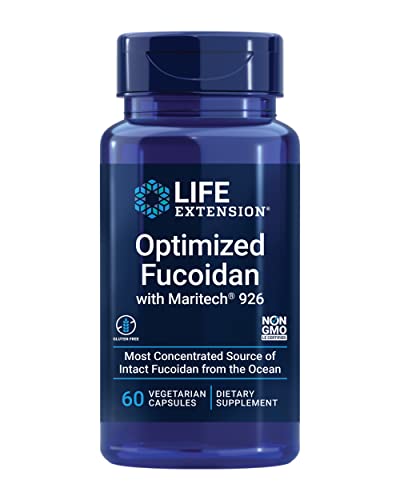Fucoidan for Blood Sugar? New Study Shows Promise
Quick Summary: Researchers found that a specific extraction method for fucoidan from seaweed showed a strong ability to block an enzyme related to blood sugar control. This suggests fucoidan might help manage blood sugar levels.
What The Research Found
The study looked at different ways to get fucoidan from seaweed. They found that one method, called hydrothermal extraction, produced fucoidan that was very effective at stopping an enzyme called α-glucosidase. This enzyme helps break down carbohydrates into sugar. By blocking it, fucoidan might help keep blood sugar levels stable.
Study Details
- Who was studied: The study used seaweed (Sargassum sp.) to extract fucoidan. No people or animals were involved.
- How long: The study focused on the extraction process, with each method taking a specific amount of time (e.g., 40 minutes for hydrothermal extraction).
- What they took: The researchers tested the fucoidan extracted using different methods. They didn't give it to anyone.
What This Means For You
This research is promising, but it's still early. It suggests that fucoidan, especially when extracted using a specific method, could potentially help with blood sugar control. More research is needed to see if it works the same way in people.
Study Limitations
This study was done in a lab, not on people. This means we don't know if fucoidan will have the same effect in your body. Also, the study only looked at one type of seaweed and didn't test different amounts of fucoidan.
Technical Analysis Details
Key Findings
This in vitro study demonstrated that extraction method critically impacts fucoidan yield, structure, and bioactivity from Sargassum sp. Hydrothermal extraction (HT) at 140°C for 40 min yielded the highest fucoidan quantity (105.64 ± 2.14 mg/g dry weight). Antioxidant capacity followed the order: microwave-assisted extraction (MAE) > ultrasonic-assisted extraction (UAE) > HT. Crucially, the purified HT extract (140-40-Pure) exhibited the strongest α-glucosidase inhibition (96% at the tested concentration), indicating high potential for modulating carbohydrate digestion and blood sugar regulation. Structural differences in sulfation and molecular weight across methods drove these bioactivity variations.
Study Design
This was an in vitro comparative methodology study evaluating three extraction techniques: hydrothermal (HT), microwave-assisted (MAE), and ultrasonic-assisted (UAE). No human or animal subjects were involved; the sample consisted of Sargassum sp. seaweed biomass. The study assessed physicochemical properties (yield, sulfation, molecular weight) and bioactivities (antioxidant assays, α-glucosidase inhibition) of the extracted fucoidans. Duration of extraction processes was specified per method (e.g., HT: 40 min), but no longitudinal biological testing period was reported.
Dosage & Administration
As an in vitro extraction and bioactivity screening study, no doses were administered to subjects. Bioactivity tests (e.g., α-glucosidase inhibition, antioxidant assays) were conducted in vitro using the purified fucoidan extracts at specific concentrations determined by the researchers. The "96% inhibition" refers to the effect of the HT-purified fucoidan at the concentration used in the enzymatic assay.
Results & Efficacy
HT yielded significantly more fucoidan (105.64 ± 2.14 mg/g) than MAE or UAE under the tested conditions. MAE-derived fucoidan showed the highest antioxidant activity (quantitative values for specific assays like DPPH or FRAP were not provided in the summary, but the rank order MAE > UAE > HT was stated). The most significant efficacy finding was the HT extract's (140-40-Pure) potent α-glucosidase inhibition (96%), substantially outperforming extracts from other methods. The summary indicates these differences in yield and bioactivity were statistically significant ("extraction methods significantly influenced"), though specific p-values or confidence intervals were not detailed.
Limitations
Key limitations include the purely in vitro nature of the bioactivity testing, meaning results cannot be directly extrapolated to human health effects. No information on fucoidan purity beyond the "Pure" designation for the HT extract was provided. The study focused solely on extraction methodology comparison using one seaweed species (Sargassum sp.), limiting generalizability to other sources or real-world supplement formulations. Crucially, no dose-response curves for α-glucosidase inhibition or antioxidant effects were summarized, hindering potency comparisons. Future research needs in vivo validation and clinical trials.
Clinical Relevance
This study highlights that the extraction process profoundly affects fucoidan's functional properties. For supplement users and manufacturers, it suggests that hydrothermal extraction may optimize yield and α-glucosidase inhibitory potential (relevant for blood sugar management), while microwave extraction may better preserve antioxidant activity. However, as an early-stage in vitro study, it does not confirm efficacy in humans. Consumers should not interpret the 96% inhibition result as a guaranteed clinical effect; it indicates biochemical potential only. The findings primarily inform sustainable production methods for developing more effective fucoidan-based nutraceuticals, emphasizing the need to standardize extraction protocols for specific health targets.
Original Study Reference
From seaweed to superfood: Next-generation fucoidan extraction, structural and bioactivity evaluation for sustainable health solutions.
Source: PubMed
Published: 2025-05-01
📄 Read Full Study (PMID: 40174842)




